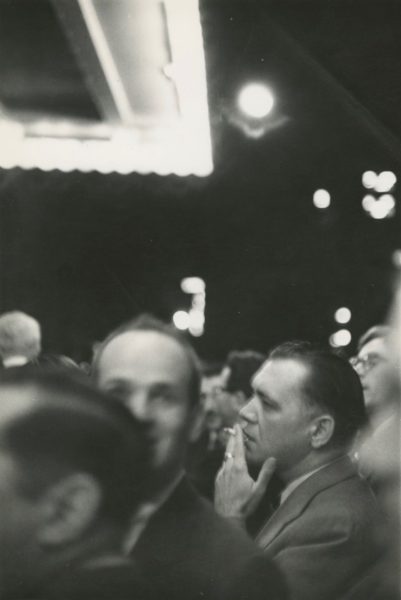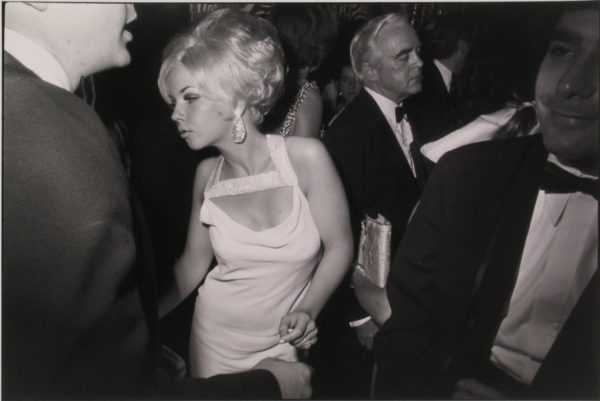
Jacques Lowe (1913–2001)
Walter Kerr during first-night intermission, 1956
Gelatin silver print on paper
14 x 11 in.
Gift of Sally Strauss and Andrew E. Tomback
Scripps College, Claremont, CA
Playwright and critic Walter Kerr dominated the New York theater scene for over three decades. Widely considered the authority on Broadway debuts, his evocative opening night reviews could prove the success or failure of a production.
In addition to his review career, he directed several Tony award-winning musicals by his wife, the popular playwright Jean Collins Kerr. He authored ten books, including How Not to Write a Play, and received the 1978 Pulitzer Prize for Criticism. His most famous review was also his shortest: after seeing I Am A Camera in 1951, he wrote simply, “Me no Leica.”
In Walter Kerr during first-night intermission, Jacques Lowe captures at once Kerr’s unpretentiousness and authoritativeness at the height of his influence in the mid-fifties. He is clearly the important figure here. The moon at the top of the composition acts almost as a theater spotlight to illuminate his presence. Combined with the luminescent glow of the marquee, it casts Kerr, not any actor, as the lead in this composition.
For an influential figure, though, he’s an unassuming one, caught in a relaxed moment with a cigarette midway to his mouth. He looks out into the crowd but his thoughts are elsewhere—he pays entirely no attention to the camera nor the people around him. Neither does anyone take notice of him. Two men converse to his left, contrasting his solitude. His presence is a moment of introspection in the midst of the excited chatter of a crowd energized by opening night.
The image is reminiscent of those by street photographer Garry Winogrand, but it differs in significant ways from, say, Centennial Ball, Metropolitan Museum, New York, 1969.

Centennial Ball, Metropolitan Museum, New York, 1969. 11 x 14 in. Image courtesy of the Pomona College Museum of Art.
Winogrand transforms the woman’s private moment into a shockingly public one. The top-heavy composition and bright flash create a voyeuristic perspective of the gala attendees. In contrast, with its low key lighting, soft focus, and distance from the subject, Lowe’s image is neither obtrusive nor designed to shock. The visual emphasis on Kerr doesn’t disrupt his private moment but subtly highlights it.
In considering Lowe’s candid portrait of Kerr, it seems natural to compare photographer and subject. After fifteen years at The New York Herald Tribune, Kerr moved to The New York Times in 1966, where he chose to write Sunday reviews, moving away from the role of opening-night critic. Wary of his influence on the theater scene, he published second opinions to divide the monolith of critical power.
Like the critic, Lowe, too, was unassuming. Most prominently known for photographing President John F. Kennedy, he declined a position as the official White House documenter in order to capture the more personal side of the Kennedys. His approximately 40,000 images of the family attest to his ability to authentically represent the Camelot years of the White House.
Lowe’s unobtrusive but arresting portrait of Kerr shows the tendencies of both men to shape their respective fields without dominating them, turning down conspicuous roles in order to do what they loved without constraint.
Much as it would have fifty years ago, the pressing question the image leaves us with now is: so what does Kerr think of the show?
Lauren Koenig ’20, Wilson Intern Summer 2018
Sources
“Lauded Theater Critic Walter Kerr Dies at 83.” The Washington Post, WP Company, 11 Oct. 1996, www.washingtonpost.com/archive/local/1996/10/11/lauded-theater-critic-walter-kerr-dies-at-83/3dfa3436-98d7-4a6f-804a-9835818c9540/?noredirect=on&utm_term=.745d3d644290.
Rich, Frank. “The Drama Critic Who Made the Pulse Race.” The New York Times, 20 Oct. 1996, https://www.nytimes.com/1996/10/20/theater/the-drama-critic-who-made-the-pulse-race.html.
Schlesinger, Arthur M. J.F.K. Remembered. Thornwillow Press, 1988.
Viagas, Robert. “Pulitzer-Winning Critic Walter Kerr Dies at 83.” Playbill, Playbill Inc., 10 Oct. 1996, www.playbill.com/article/pulitzer-winning-critic-walter-kerr-dies-at-83-com-329031.
“Walter Francis Kerr.” Encyclopædia Britannica, Encyclopædia Britannica, Inc., 29 Dec. 1996, www.britannica.com/biography/Walter-F-Kerr.
“Walter Kerr.” Walter Kerr, Pulitzer Winning Critic, Walter Kerr Theatre, www.walterkerrtheatre.com/biography.php.
Image on slider: Jacques Lowe (1913–2001), Walter Kerr during first-night intermission, (detail), 1956, gelatin silver print on paper, 14 x 11 in., gift of Sally Strauss and Andrew E. Tomback, Scripps College, Claremont, CA

